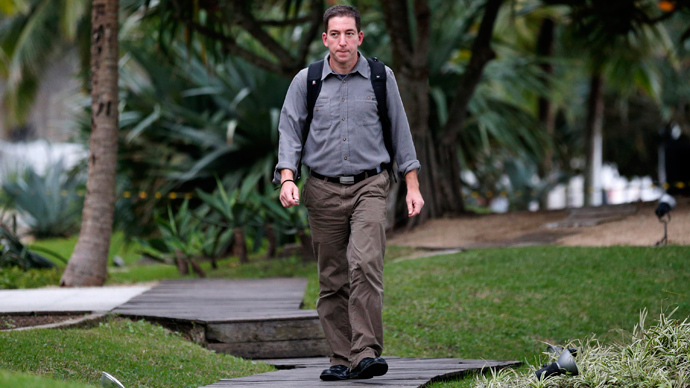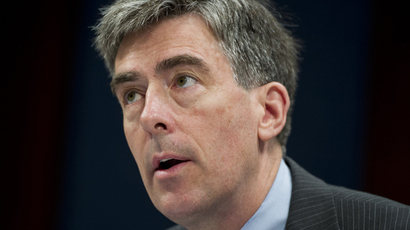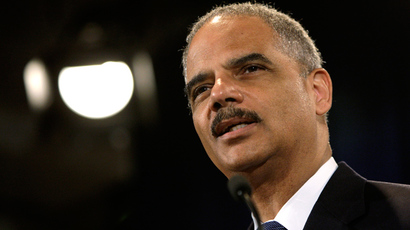Low-level NSA analysts can spy on Americans – Greenwald

NSA spying programs give access to US citizens’ private data to low-level analysts with little court approval or supervision, says Guardian journalist Glenn Greenwald, who broke the story on Washington’s PRISM surveillance system.
“[PRISM] is an incredibly powerful and invasive tool,” Greenwald told ABC’s ‘This Week.’ The NSA programs are “exactly the type that Mr. Snowden described. NSA officials are going to be testifying before the Senate on Wednesday, and I defy them to deny that these programs work exactly as I’ve said.”
The NSA keeps trillions of telephone calls and emails in their databases which they can access anytime with simple screen programs, he said.
“And what these programs are, are very simple screens, like the ones that supermarket clerks or shipping and receiving clerks use, where all an analyst has to do is enter an email address or an IP address, and it does two things.”
“It searches that database and lets them listen to the calls or read the emails of everything that the NSA has stored, or look at the browsing histories or Google search terms that you’ve entered, and it also alerts them to any further activity that people connected to that email address or that IP address do in the future.”
While the program conducts wiretapping with little court approval or supervision, there are “legal constraints” on surveillance that require approval by the Foreign Intelligence Surveillance Act (FISA) of 1978, in which court judges can secretly review the government's plans to track suspected terrorists in advance.
“You can’t target [Americans] without going to the FISA court,” Greenwald stressed. “But these systems allow analysts to listen to whatever emails they want, whatever telephone calls, browsing histories, Microsoft Word documents.”
“And it’s all done with no need to go to a court, with no need
to even get supervisor approval on the part of the analyst,”
he added.
55% of the House Democratic caucus voted last week against the WH *and their own leadership to ban NSA bulk spying against Americans
— Glenn Greenwald (@ggreenwald) July 27, 2013
Greenwald will testify before a Congressional committee on Wednesday, along with NSA officials who have previously downplayed Snowden’s claims about the agency’s easy-access data.
PRISM is a mass electronic surveillance data mining program operated by the NSA since 2007. The program was exposed by former NSA contractor Edward Snowden earlier this summer. Snowden leaked information about the program to the media, warning of a far greater extent of mass data collection than the public knew existed. The disclosures were published by The Guardian and The Washington Post on June 6.
Snowden later leaked further information to Greenwald which pertained to mass security operations carried out across the world. He spoke of British spy agency GCHQ, which uses the Tempora surveillance program. The whistleblower also shared information regarding Germany’s cooperation with US intelligence, which reportedly combs through half a billion German phone calls, emails, and text messages on a daily basis.
A call for transparency on surveillance programs
The call for increased oversight and transparency for surveillance programs has been growing, even among supporters of the NSA.
“I do think that we’re going to have to make some change to
make things more transparent,” Senator Saxby Chambliss, vice
chairman of the Senate Intelligence Committee, told ABC.
Dick Durbin: current NSA domestic spying goes "way too far" http://t.co/kcwugbFP4A
— Glenn Greenwald (@ggreenwald) July 28, 2013
Former federal judge James Robertson, who used to grant surveillance orders, said he was shocked to hear of changes to allow broader authorization of NSA programs - such as the monitoring of US phone records. He urged for a reform which would to allow counter-arguments to be heard.
“What FISA does is not adjudication, but approval,” Robertson said, speaking as a witness during the first public hearings into the Snowden revelations. “This works just fine when it deals with individual applications for warrants, but the 2008 amendment has turned the FISA court into an administrative agency making rules for others to follow.”
However, government officials have defended the surveillance initiatives as authorized under law, claiming they are necessary in order to guard the country against terrorist threats.
Following Snowden’s revelations on NSA surveillance, President Barack Obama assured US citizens in June that “nobody is listening to [their] telephone calls."
He said the surveillance programs monitor phone numbers and the durations of calls, adding that if there are any suspicions and "if the intelligence community then actually wants to listen to a phone call, they've got to go back to a federal judge, just like they would in a criminal investigation."
President Obama added that America is "going to have to make some choices" between privacy and security, warning that the highly publicized programs will make it harder to target terrorists.
Meanwhile, deputy FBI Director Sean Joyce said that the “program is not intentionally used to target any US citizens" and is “key in our counter-terrorism efforts."
Testifying on Capitol Hill before the House Permanent Select Committee on Intelligence in June, NSA director Gen. Keith Alexander claimed that the NSA’s storage of millions of phone records has thwarted more than 50 terror attacks in more than 20 countries since September 11, 2001. However, evidence of the prevented attacks has not been revealed














